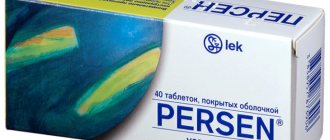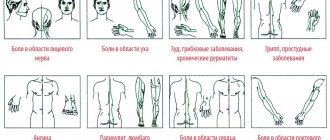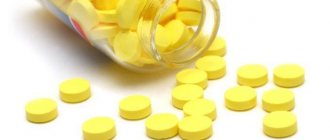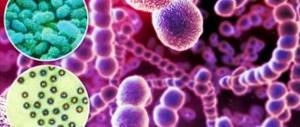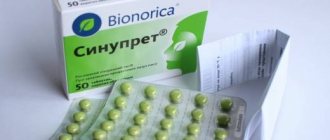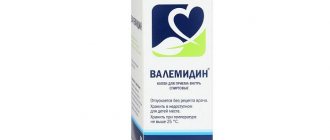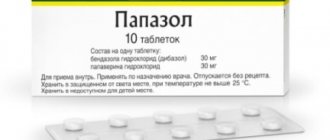Venoruton refers to angioprotectors, and also has a phlebotonic effect. The drug restores blood circulation in the capillaries, improves vascular tone, and has analgesic and anti-inflammatory properties.
This product contains active substances - hydroxyethyl rutosides (a derivative of rutin, which belongs to the vitamin P group), as well as auxiliary elements: sodium hydroxide, carbomer 980, benzalkonium chloride, distilled water and others, depending on the form of the drug.
The medicinal properties of this drug are due to the presence of active components.
Venoruton primarily affects veins and capillaries and is used to restore blood microcirculation and improve the condition of vessel walls.
In addition, it has an analgesic, antioxidant and anti-inflammatory effect, which helps neutralize the negative symptoms of vein diseases, such as cramps, swelling, pain.
This is why Venoruton is so effective for the treatment of venous diseases (including in the presence of inflammatory processes), hemorrhoids, and also as an adjuvant for diabetes.
Forms of release of the drug
Venoruton is available in three forms: capsules, tablets, gel.
- Capsules. Gelatin capsules are beige-yellow in color, odorless. Inside the capsule is a yellow-brown powder containing 300 mg of active substance. For internal use.
- Pills. Round effervescent tablets are yellow in color and have a slight orange odor. They contain significantly more active substance compared to capsules (1 g per tablet). For internal use.
- Gel. Transparent gel with a yellowish tint, odorless. 1 gram of gel contains 20 mg of active substance. For external use.
Compound
The active ingredient of Venoruton is rutoside - a glycoside of the flavonoid quercetin, belonging to the vitamin P group. Its concentration, as well as the list of auxiliary components in the drug, depend on the specific form of release:
- The gel contains 20 mg of the active substance - 0-(β-hydroxyethyl)-rutoside. The following additional elements are presented: carbomer 980;
- sodium hydroxide (30% solution);
- disodium EDTA;
- benzalkonium chloride;
- purified water.
What happens after the medicine enters the body
Pharmacokinetics explains the processes that occur with a drug when it enters the body.
When using Venoruton orally, the drug is absorbed into the blood and distributed throughout the body within 1-9 hours.
When using the gel, the active substances appear in the subcutaneous fatty tissue within 2-5 hours. Excretion from the body occurs in approximately 48 hours, mainly through bile and urine.
No less effective for all kinds of problems with veins is heparin ointment, reviews of patients and doctors about which you will find in our material. What is most often caused by venous insufficiency of the lower extremities? Find out the answers to questions related to VNNK.
Indications for use
Based on the instructions for use, Venoruton tablets and capsules are indicated for the treatment of the following diseases:
- Chronic venous insufficiency. The disease manifests itself in swelling of the veins, heaviness in the legs, pain, swelling, and cramps in the affected area. The composition of the drug has venotonic properties and normalizes blood circulation, and also eliminates these symptoms due to its anti-inflammatory and analgesic properties.
- Postphlebitic syndrome.
- Ulcers and dermatitis caused by varicose veins, trophic disorders. The drug can be used in the complex treatment of this problem, as it has anti-inflammatory and analgesic properties. In addition, normalization of blood circulation in the vessels also contributes to the speedy healing of wounds.
- Haemorrhoids. Venoruton effectively fights the symptoms of hemorrhoids (itching, pain, bleeding). The active components of the drug help relieve inflammation and eliminate pain. In addition, the positive effect of Venoruton on blood flow helps fight the cause of hemorrhoids - thrombosis of the rectal veins.
- The drug is also used to relieve pain after sclerotherapy and removal of varicose veins.
- As an adjuvant, Venoruton is used in the treatment of atherosclerosis, arterial hypertension, and renitopathy in patients with diabetes mellitus.
The same instructions for use indicate that Venoruton in gel form is used for :
- neutralization of symptoms of chronic venous insufficiency (swelling, pain, cramps);
- reducing pain after sclerotherapy;
- treatment of bruises, sprains, ligament damage;
- eliminating heaviness and pain in the legs, swelling of the ankles.
The drug Venoruton: instructions for use
Venoruton is an effective medicine that is produced in the form of a gel, tablets/capsules or effervescent instant tablets.
It has a tonic and angioprotective effect on the veins - it strengthens, regulates the functioning of the walls of blood vessels and normalizes blood circulation, fights dilated veins (varicose veins).
The main active component of the drug is rutin - a flavonoid, vitamin P, which improves the permeability of blood vessels and small capillaries, preventing their fragility.
Pharmacological properties
Thanks to the active component in the composition, Venoruton has a powerful antioxidant effect on the cells of the vascular walls and reduces inflammatory processes .
Scientific research has proven that when using the drug, the active substance rutin is concentrated in the body directly in the walls of blood vessels and capillaries, penetrating their thickness by 20%. At the same time, its concentration in soft tissues located near blood vessels and in the bloodstream itself is insignificant.
The impact on vascular tissue occurs at the level of cells that are exposed to the following effects:
- protects the cell membrane (shell), stabilizes its functions;
- narrows and prevents intercellular pores from opening;
- Helps regulate fluid balance between tissues and blood flow.
Venoruton eliminates and prevents the appearance of blood stagnation in the tissues of the extremities, has a beneficial effect not only on blood vessels, but also on small capillaries, restores blood flow, saturating them with oxygen. In patients with diabetes mellitus, it significantly slows down the process of pathological changes in vision and prevents the development of microthrombosis of the retina.
The gel is usually used externally to treat varicose veins, relieve pain and heaviness in the legs . Local application does not give a long-term, systemic result, but still effectively eliminates some symptoms of the disease:
- relieves and reduces pain in the legs both due to venous insufficiency and those caused by injuries - sprained muscles and ligaments, severe bruises;
- serves as an anesthetic in the postoperative phase (sclerotherapy, removal of damaged vessels);
- relieves swelling and a feeling of heaviness in the legs (with varicose veins).
Directions for use and dosage
How to take Venoruton (you can see a photo of the drug in our article) in tablets, and how to use it in gel form? Read the instructions for use with Venoruton below.
It is advisable to use the gel in the period between systematic courses of treatment with oral medications to maintain the clinical effect or together with tablets to enhance it. As an independent remedy, the gel is used for mild symptoms, at the initial stage of the disease, to relieve pain .
The gel is applied directly to the skin, under which the damaged blood vessels are located, and very gently rubbed into the skin until completely absorbed. Before applying the gel, it is better to position your leg horizontally.
The skin must be clean and dry to ensure unhindered penetration of the drug into the blood vessels. Venoruton must be applied 2 times a day. To enhance the therapeutic effect, it is recommended to use elastic bandages or special therapeutic stockings .
Oral medications are taken orally for the treatment of various pathological changes associated with varicose veins of the legs . Unlike gel, their range of application is much wider:
- swelling and swelling of the legs;
- a constant feeling of fatigue and/or a feeling of heaviness in the legs;
- frequent cramps, tingling, “goosebumps” in the legs;
- thrombophlebitis, ulcers;
- violation of lymph outflow;
- hemorrhoids and its complications;
- visual impairment of varying degrees in diabetes mellitus.
The dosage and contraindications of Venoruton depend on the severity of the disease.
The tablets are used in courses: two weeks, 1 tablet once a day, then a break for a month and again a 2-week course of therapy.
For different diseases and their severity, the dose and duration of use vary: after surgery for varicose veins, the tablets are taken 3 times a day / 1 tablet for two weeks.
If noticeable positive changes appear, a maintenance course of treatment (1t per day).
Analogs
All drugs containing rutin as the main active ingredient are analogues of Venoruton.
They are also manufactured under license from Novartis (like Venoruton) or other pharmaceutical companies.
All of them are available without prescriptions in pharmacies or can be ordered in online stores.
The most common of them and close in effectiveness to the original, as well as the cheapest analogues of Venoruton, are: “Rutin”, “Troxevasin”, “Troxerutin”, “Verutil”.
Reviews about the drug
Most often there are positive reviews about Venoruton tablets. After just one course, noticeable improvements in the condition of patients are observed for any disease associated with pathological changes in the veins or lymph nodes.
Significant improvements are being achieved in the treatment of hemorrhoids.
Nadezhda, 38 years old: An excellent drug, it helps very well. After the course of treatment, improvements are immediately noticeable: my legs don’t twist at night, the pain has gone, the blue spots on the veins have decreased significantly. Really helped me. Now I take 1 tablet a day for prevention.
Lyuba Soboleva: I’m happy with the drug, the network of small vessels in my legs has disappeared, cramps at night no longer bother me, I practically don’t feel tired in my legs.
How the drug works
As already noted, Venoruton has angioprotective and phlebotonic effects .
The medicinal properties of the drug are manifested due to the action of the active component. Venoruton tones the walls of blood vessels, strengthens and normalizes their permeability, and reduces capillary fragility.
The drug also improves blood microcirculation and eliminates stagnation.
In addition, rutosides, which are part of the product, inhibit enzymes responsible for inflammatory processes, which determines the anti-inflammatory properties of the drug; help reduce the oxidative activity of oxygen and protect blood vessels from toxic substances and free radicals, thereby providing an antioxidant effect.
It should be noted that the active component of the drug also has analgesic, decongestant and anticonvulsant properties.
Directions for use and dosage
The instructions for use of tablets and capsules indicate that the drug is for internal use and is most often prescribed for a course of 2-4 weeks, but in some cases treatment can last up to two months.
The drug should be taken with meals 2-3 times a day as a medicine or 1 time a day as a maintenance agent.
The regimen of use may vary depending on the disease, the patient’s condition and the desired effect.
In each specific case, you should consult your doctor.
Features of use for various diseases:
- Chronic venous insufficiency, varicose veins, hemorrhoids: 3 grams of the drug 3-4 times a day (capsules) or 1 tablet 2 times a day until a positive effect occurs (usually 2 weeks). The course is repeated if necessary.
- Use to relieve pain after sclerotherapy : the daily dose of the drug is 3 grams, divided into 3-4 doses.
- Retinopathy in diabetes: the daily dose of the drug is from 9 grams, divided into 3-4 doses.
gel must be applied to the affected area in a thin layer 2-3 times a day.
Movements during application should be light and careful.
The duration of treatment is determined individually until a positive effect is achieved.
If the patient's condition improves, it is recommended to switch to a one-time application of the drug, preferably in the evening. To enhance effectiveness, you can use elastic bandages.
Features of the use of tablets and capsules
The drug dosage regimen is selected for each patient, taking into account his disease and the characteristics of his health. Typically, in the first days of treatment, the patient is prescribed 3 capsules throughout the day. After 10–14 days, the medication may be discontinued or its dose reduced. It depends on the therapeutic effect produced. If the desired result is not achieved, the medication continues at the same dosage or is reduced to 2 capsules per day. This therapy usually lasts up to a month.
Among pregnant women, the drug is prescribed from the second trimester
When treating lymphostasis, the daily dose is up to 3 g of the drug per day, dividing the dose into 3 times at equal intervals. During the treatment of diabetic retinopathy, patients are prescribed 3 to 6 capsules throughout the day.
Special instructions for use and precautions
During pregnancy, Venoruton can be used, starting from the second trimester.
During breastfeeding, women can also use this drug , since its concentration in breast milk will be insignificant and will not harm the baby.
The use of the drug does not have a negative effect on the ability to drive a vehicle or engage in activities requiring high concentration.
If after a course of treatment the condition does not improve, you should consult a doctor to clarify the diagnosis and adjust the treatment.
It is recommended to consult a doctor before use.
Reviews from doctors and patients
Patients who have used Venoruton as prescribed by a doctor leave mostly positive reviews on numerous forums, noting that the drug has a positive effect.
Many note that a two-week course of using this remedy neutralizes the unpleasant symptoms of vascular diseases (swelling, night cramps, leg pain), and also removes the “network of veins.”
In addition, Venoruton has also received a lot of positive reviews as a prophylactic agent.
However, you can also find sharply negative reviews, most often from patients who independently prescribed this drug to themselves, without taking into account the individual characteristics of their disease and the state of their body.
Reviews from doctors point out that it is advisable to use the drug after a specialist has prescribed the course of treatment you need. And they note that one should not hope for a complete cure with Venoruton; an integrated approach is required.
Advantages of Venoruton:
- ease of use;
- There are practically no side effects;
- long shelf life (4-5 years, depending on the release form);
- available without a prescription;
- a noticeable positive effect, especially as a prophylactic agent, when using the drug as prescribed by a doctor.
Disadvantages of Venoruton:
- relatively high price;
- use may cause negative consequences (nausea, headaches, allergic reaction);
- poorly absorbed from the gastrointestinal tract;
- As a rule, it is effective only as a component of complex treatment.
Worthy analogues
There are a considerable number of analogues of the drug.
Troxevasin
Pharmacological group - angioprotectors. Troxevasin is available in the form of capsules and gel.
It is used for chronic venous insufficiency, postphlebitic syndrome, trophic disorders, hemorrhoids, and also as an adjuvant for retinopathy in patients with diabetes.
The active component is troxerutin, the concentration practically coincides with the volume of the active substance in Venoruton.
Contraindications and application features are similar to Venoruton. In addition, the drug is contraindicated for gastritis and peptic ulcers of the gastrointestinal tract.
Price per gel: 150-200 rubles.
Price for capsules: 300-500 rubles.
Troxerutin
Belongs to the pharmacological group of angioprotectors. Troxerutin is available in the form of gel and capsules.
Indicated for venous insufficiency, superficial thrombophlebitis, phlebitis, varicose veins, hemorrhoids, bruises and sprains, and also as an adjuvant for the treatment of diabetic renitopathy.
The active component is troxerutin, the concentration practically coincides with the volume of the active substance in Venoruton and Troxevasin.
Contraindications and application features are similar to Venoruton. The drug in capsule form is also contraindicated in patients with renal impairment, lactase deficiency and galactosemia.
Price per gel: 20-35 rubles.
Price for capsules: 130-570 rubles.
Analogs
Analogs of Venoruton based on the active substance hydroxyethylrutoside (the manufacturer classifies it as a group of oxerutins, in the Russian classification it corresponds to rutoside) are capsules and tablets that contain rutin: Ascorutin, Anvimax, Troxerutin, Paroven, Verutil.
All ointments and gels based on rutin have a similar effect: Lavenum gel, Troxerutin gel, Indovazin, Venolife.
Analogues of Venoruton

